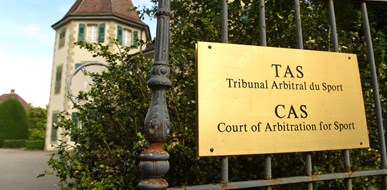[Sports law] EU advocate general cites Asser Institute researcher in opinion challenging the Court of Arbitration for sport
Published 17 January 2025
@Shutterstock
A potential landmark ruling by the Court of Justice of the European Union (CJEU) is challenging the authority of the Court of Arbitration for Sport (CAS), the long-standing arbiter of key disputes in transnational sports governance. CJEU’s Advocate General Tamara Ćapeta’s opinion, published yesterday, suggests that athletes and organisations should have the right to challenge CAS awards on the basis of EU law in the national courts of EU member states, potentially subjecting sports governance to much greater judicial oversight.
Interviewed by the New York Times’s sports journalism department The Athletic yesterday, Antoine Duval, head of the Asser Institute’s International Sports Law Centre, said: “If the court follows her opinion, any CAS award…will be challengeable before any national court in the EU, on the basis of EU law.”
Duval, whose work was quoted multiple times in Ćapeta’s opinion, emphasised that while such challenges would be costly and time-consuming - and thus only a few athletes and sports clubs would be able to entertain them – the solution advocated by the AG would in any case “facilitate challenges, which ultimately will land at the CJEU.” This, he added, would “further reinforce (the CJEU’s) position as the court of last resort to review transnational sports governance,” signaling a significant shift in the institutional landscape of transnational sports law. The CJEU’s final ruling is expected in the coming months.
The developments in sports arbitration stem from a dispute between Belgian football club RFC Seraing and FIFA over third-party ownership of players. While Seraing’s appeals to both CAS and the Swiss Federal Supreme Court were unsuccessful, the case eventually reached the CJEU via the Belgium courts. The Seraing case comes shortly after another recent ruling of the CJEU in the ISU case, which was initiated by Asser Institute researchers (Ben Van Rompuy (now at Leiden University) and Antoine Duval), had already curtailed the bindingness of CAS arbitration clauses.
Read the full opinion.
Read more
The Court of Arbitration for Sport and EU Law: Chronicle of an Encounter
At the time when the Bosnian case was decided, nearly twenty years ago, few could have predicted that one of its main institutional legacies would be the transformation of the Court of Arbitration for Sport (CAS) in Lausanne into a true ‘Supreme Court of World Sport’. In fact, the use of arbitration has proven to be a very successful legal strategy to curb access to national courts and to curtail the reach of EU law in the sporting world. Read more.
The international skating union ruling of the CJEU and the future of CAS arbitration in transnational sports governance
One of the least visible and yet potentially most consequential findings in the trio of decisions related to transnational sports governance rendered by the Grand Chamber of the Court of Justice of the European Union (CJEU) on 21 December 2023 concerns the Court of Arbitration for Sport (CAS). It is relatively easy to overlook, as it is tucked away in the much-less scrutinized International Skating Union (ISU) judgment of the Court. Yet, as will be argued at the end of this article, the CJEU’s conclusions regarding the bindingness of CAS arbitration are consequential and will limit the function of the CAS as a kind of safety valve for the Olympic Movement. Read more.
Towards a Transnational Solange: The Court of Arbitration for Sport and EU Law
About Antoine Duval
Dr Antoine Duval coordinates the research strand on advancing public interests in international and European law. He is a Senior Researcher at the Asser Instituut since February 2014 and defended his PhD at the European University Institute in Florence in September 2015. His thesis dealt with the legal interaction between the Lex Sportiva (the private regulations governing international sports) and EU Law. He is the founder and editor-in-chief of the ASSER International Sports Law Blog, founder and editor of the Yearbook of International Sports Arbitration, and a member of the editorial board of the International Sports Law Journal and International Sports Law book Series of Asser Press. His research focuses on the role of private actors in transnational law, using the lex sportiva as his main case study.
